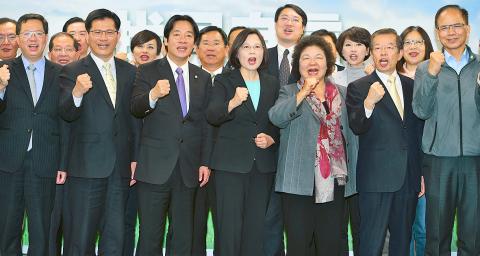Democratic Progressive Party (DPP) Chairperson Tsai Ing-wen (蔡英文) formally declared her candidacy for next year’s presidential race yesterday after receiving her party’s nomination, calling for solidarity and strength to change the nation.
“Today is an important day and I am honored to accept the DPP’s nomination to take part in the Republic of China’s next presidential election on behalf of the DPP,” Tsai, 58, told a press conference at DPP headquarters in Taipei.
Tsai’s nomination was approved at a meeting of the party’s Central Executive Committee to a round of applause shortly before the press conference.

Photo: Liao Chen-huei, Taipei Times
It will be Tsai’s second shot at the presidency, after losing to President Ma Ying-jeou (馬英九) of the Chinese Nationalist Party (KMT) in the 2012 presidential election, in which Tsai garnered 45.63 percent of the votes, while Ma received 51.6 percent.
“The night we were beaten, there were many young people crying,” Tsai said.
“Today, I want to tell you all — and myself — I will do whatever I can to turn those tears to laughter,” Tsai added.
Tsai said the development of cross-strait relations had to be subject to the will of Taiwanese and could not be undertaken as party-to-party negotiations.
“The basic principle of our party in cross-strait relations is to maintain the ‘status quo,’” Tsai said.
“After we [the DPP] come to power, we will examine agreements [with China] case by case, according to the law, and will continue negotiations,” she added.
Tsai also attacked the KMT over the nation’s growing wealth gap and growing youth unemployment, vowing to rehabilitate the nation’s economy.
“The government has shut the door on the public and refused to listen to them,” she said.
The KMT has yet to announce its nomination, but Tsai leads all the likely candidates in opinion polls.
As the DPP announced its candidate for next year’s presidential election, China yesterday warned the party to heed the lessons of the last time it was in power and not to push for independence.
“If [the DPP] upholds the Taiwanese independence splittist position of ‘one country on either side of the Taiwan Strait,’ then it will be hard to find a way out for cross-strait relations,” China’s Taiwan Affairs Office spokesman Ma Xiaoguang (馬曉光) told a regular press briefing in Beijing. “This is not a new talking point — this is what happened between 2000 and 2008. One need not look far for a lesson.”

Intelligence agents have recorded 510,000 instances of “controversial information” being spread online by the Chinese Communist Party (CCP) so far this year, the National Security Bureau (NSB) said in a report yesterday, as it warned of artificial intelligence (AI) being employed to generate destabilizing misinformation. The bureau submitted a written report to the Legislative Yuan in preparation for National Security Bureau Director-General Tsai Ming-yen’s (蔡明彥) appearance before the Foreign Affairs and National Defense Committee today. The CCP has been using cognitive warfare to divide Taiwanese society by commenting on controversial issues such as Taiwan Semiconductor Manufacturing Co’s (TSMC, 台積電) investments in the

INVESTIGATION: The case is the latest instance of a DPP figure being implicated in an espionage network accused of allegedly leaking information to Chinese intelligence Democratic Progressive Party (DPP) member Ho Jen-chieh (何仁傑) was detained and held incommunicado yesterday on suspicion of spying for China during his tenure as assistant to then-minister of foreign affairs Joseph Wu (吳釗燮). The Taipei District Prosecutors’ Office said Ho was implicated during its investigation into alleged spying activities by former Presidential Office consultant Wu Shang-yu (吳尚雨). Prosecutors said there is reason to believe Ho breached the National Security Act (國家安全法) by leaking classified Ministry of Foreign Affairs information to Chinese intelligence. Following interrogation, prosecutors petitioned the Taipei District Court to detain Ho, citing concerns over potential collusion or tampering of evidence. The

‘COMPREHENSIVE PLAN’: Lin Chia-lung said that the government was ready to talk about a variety of issues, including investment in and purchases from the US The National Stabilization Fund (NSF) yesterday announced that it would step in to staunch stock market losses for the ninth time in the nation’s history. An NSF board meeting, originally scheduled for Monday next week, was moved to yesterday after stocks plummeted in the wake of US President Donald Trump’s announcement of 32 percent tariffs on Taiwan on Wednesday last week. Board members voted to support the stock market with the NT$500 billion (US$15.15 billion) fund, with injections of funds to begin as soon as today. The NSF in 2000 injected NT$120 billion to stabilize stocks, the most ever. The lowest amount it

NEGOTIATIONS: Taiwan has good relations with Washington and the outlook for the negotiations looks promising, Minister of Economic Affairs J.W. Kuo said Taiwan’s GDP growth this year is expected to decrease by 0.43 to 1.61 percentage points due to the effects of US tariffs, National Development Council (NDC) Minister Paul Liu (劉鏡清) said at a meeting of the legislature’s Economics Committee in Taipei yesterday, citing a preliminary estimate by a private research institution. Taiwan’s economy would be significantly affected by the 32 percent “reciprocal” tariffs slapped by the US, which took effect yesterday, Liu said, adding that GDP growth could fall below 3 percent and potentially even dip below 2 percent to 1.53 percent this year. The council has commissioned another institution